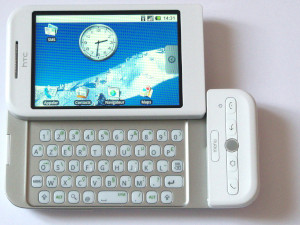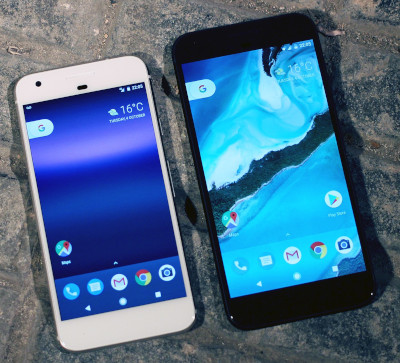Apple, Google and aligned incentives
Published on

The HTC Dream, the first phone released running Android.
For the past decade I’ve exclusively used Android phones. I got the HTC Dream (aka the T-Mobile G1) shortly after it came out, and dutifully upgraded every 1-2 years. In that timespan I used Android as the basis for my Master’s Thesis, took a job on the Android team at Google, and eventually became a contractor specialising in Android app development. So when I switched to using an iPhone earlier this year a few people were surprised1.
The good old days
When Android was announced in 2007 – alongside the formation of the Open Handset Alliance – it was positioned as a bastion of openness: it would be built on open standards and the operating system would be open source. At the time iPhones were strongly coupled to iTunes and Apple was exercising strict control over what app developers could do.
When the HTC Dream was released it lived up to expectations. You could write apps for it without shelling out for a Mac! You could get root access, and it was running Linux under the hood! A whole ecosystem of custom firmwares and bootloaders started to appear, thanks to the open source nature of the OS. It shipped with some Google apps, but they were just normal apps that served as examples of what could be done.
After the Dream came a line of Nexus devices. These were Android’s flagship devices, designed to show off what a good Android phone should look like. Both the hardware and software releases tended to feature interesting, useful upgrades. Some of the original open source apps were replaced with closed source, Google proprietary ones, but that was OK - the open source versions lived on in the open source project as examples of what you could do. The devices allowed flashing custom firmware, and the OS source was always released… eventually.
The downfall

The Pixel and Pixel XL
Over time, Android has got less and less free. The Nexus line of phones gave way to the Pixel range, which got rid of the clearly demarcated border where Android ended and Google began. The Android 11 highlights list is dotted with sections that say “On Pixel devices…”, and every single one is a software feature that could be implemented on any device, but Google have decided to keep it proprietary instead of releasing it as part of the open source platform.
At the same time more and more functionality has been added to Google Play Services. This was originally a shared location for Google specific services - in 2012 it merely handled some Google+ functionality and dealing with OAuth for Google accounts. These days it contains a huge swathe of Google services, as well as platform functionality such as push notifications, barcode scanning, geolocation, and so on. Google Play Services isn’t part of the Android Open Source Project, and is only available under license from Google. You can’t really have a device without these functions, so as a manufacturer you have the choice between agreeing to whatever terms Google requires2 or spending an awful lot of development time creating an alternative.
While these are fairly abstract arguments about what a free platform should look like, during the same period there has been a marked restriction in how you can actually use Android devices – both as an end-user and as a developer. iOS has always had very stark restrictions on what apps can do in the background; Android started its life allowing pretty much anything, like any good general purpose computing device. This inevitably lead to lots of apps doing lots of things that ranged from stupid to mildly suboptimal, creating a tragedy of the commons amongst apps. The victim was the phone’s battery life, and Google’s solution was a progressive series of restrictions on what apps can do and when. This includes limits on when push notifications are delivered to a device, how frequently apps can wake up, and so forth. Some of these can be bypassed by the end-user, but not all, and the process is fairly cumbersome.
Aligned incentives
From my point of view, Android and iOS are now pretty much in a similar place. They’re not general purpose computers, but app consoles: much like games consoles they consist of hardware and software that the user lacks control over but accepts in order to access the library of apps/games.
Given there’s no clear winner between them in terms of hardware and software, my decision came down to a more holistic question: how aligned are their incentives to my own? Apple is a product company: they make their money by producing shiny things that people want to purchase; Google is an advertising company: they make their money by using my personal information to show me targeted adverts.
For Google, Android was originally a strategic move to ensure that Apple couldn’t dominate the mobile web, and by extension the revenue from ads. As a company, there’s nothing to really push them forward in any particular direction other than one that facilitates advertising. Of course, Google employs tonnes of good people who want to do good things which counterbalances this, but I’d still prefer to deal with a company that has an intrinsic motivation to do things I want them to do, rather than one forced to by regulation, custom, or the good intent of their employees.
So the decision became obvious: if I have no strong opinions about the software and hardware, Apple is the clear winner because their incentives are a lot better aligned to mine.
Image credits
| Photo | Creator | Licence | Source |
|---|---|---|---|
| HTC Dream | Akela NDE | CC BY-SA 3.0 | Wikimedia |
| Pixel and Pixel XL | Maurizio Pesce from Milan, Italia | CC BY 2.0 | Wikimedia |
-
Or, at least, politely feigned surprise. ↩︎
-
And Google’s terms were particularly onerous: as well as requiring Chrome and Google Search to be preinstalled, they prevented manufacturers from selling any devices powered by alternative versions of Android - e.g., Samsung wouldn’t be allowed to sell a refrigerator that ran Amazon’s FireOS. The European Union handed Google a $5,000,000,000 fine for this anti-competitive behaviour, which Google are still in the process of contesting. ↩︎
Have thoughts that transcend nodding? Send me a message!
Related posts

How tech companies failed to build the Star Trek computer
In most Star Trek series, the ship or station computer is ever-present in the background, waiting to be called on by the main characters. It nearly always does exactly the right thing, and there’s little limit to the functions it can perform. Take this mundane example from DS9:

An app can be a ready meal
Three years ago I read “an app can be a home-cooked meal” by Robin Sloan. It’s a great article about how Robin cooked up an app for his family to replace a commercial one that died. It’s been stuck in my head ever since. It’s only recently that I’ve actually done anything like Robin described, though. Part of the reason was my brain got too hung up on the family...

10 Weeks with an Apple Watch 10
Around ten weeks ago I picked up an Apple Watch 10, and have been wearing it almost constantly since. It’s not my first Apple Watch — I had a Series 5 for a bit back in 2020 — but it’s the first time I’ve actually stuck with it. Ten weeks seems like an apt time to reflect on it. Firstly, why did I even bother? Well, for a couple of years I’d been wearing a Xiaomi Smart ...
{% figure "right" "White HTC Dream mobile phone" %} For the past decade I've exclusively used Android phones. I got the HTC Dream (aka the T-Mobile G1) shortly after it came out, and dutifully upgrad...